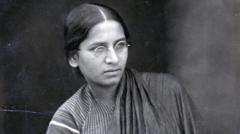Irawati Karve's groundbreaking work and her courage to defy restrictive norms in British India continue to inspire generations, shedding light on women's empowerment and the pursuit of knowledge amidst adversity.
Irawati Karve: A Trailblazer in Anthropology and Gender Equality

Irawati Karve: A Trailblazer in Anthropology and Gender Equality
A look at the life of Irawati Karve, India's first female anthropologist, who defied societal norms and challenged racial theories.
Born in British-ruled India and the only daughter among six siblings, Irawati Karve emerged as a pioneer in the field of anthropology at a time when women's education was not prioritized. She navigated through societal barriers, pursuing higher studies abroad and becoming India's first female anthropologist. Her groundbreaking research and writings, particularly on the caste system in India, remain influential in academic curricula today.
Karve's life was characterized by remarkable courage and determination. Raised in an environment that encouraged education and critical thinking, she was exposed to progressive ideologies early on, thanks to the influence of R.P. Paranjpye, a prominent educationist who became a father figure. This foundation paved the way for her to confront traditional norms, from marrying for love to pursuing an advanced degree in anthropology, despite facing opposition.
In 1927, she traveled to Berlin to study under renowned anthropologist Eugen Fischer, who held controversial views on racial superiority. In a bold move, Irawati challenged Fischer's hypothesis that linked skull shape to intelligence, ultimately conducting her own research that disproved his claims. Despite risking her academic standing, she presented her findings that critiqued the use of human differences to justify discrimination, a stand that foreshadowed the dangers of racial ideology that would be exploited by the Nazis.
Upon returning to India, Irawati undertook arduous fieldwork across remote villages, studying various tribes and their cultures. Her daring expeditions often led her to sleep in makeshift quarters while she immersed herself in the lives of the people she sought to understand. Karve’s empathetic approach allowed her to defy her own cultural conditioning, as seen in her willingness to participate in customs that stood in stark contrast to her Brahmin upbringing.
Through her writings and teachings, Irawati Karve became a voice against communalism and fundamentalism, emphasizing that India is a home for all its citizens. Her philosophy transcended academic boundaries, advocating for a humane and inclusive society.
Irawati Karve passed away in 1970, but her contributions continue to resonate, inspiring future generations in diverse fields and sparking conversations on women's rights and cultural understanding worldwide. As chronicled in the recent book "Iru: The Remarkable Life of Irawati Karve," her story is a testament to resilience and a powerful reminder of the impact one individual can have in the pursuit of knowledge and justice.




















